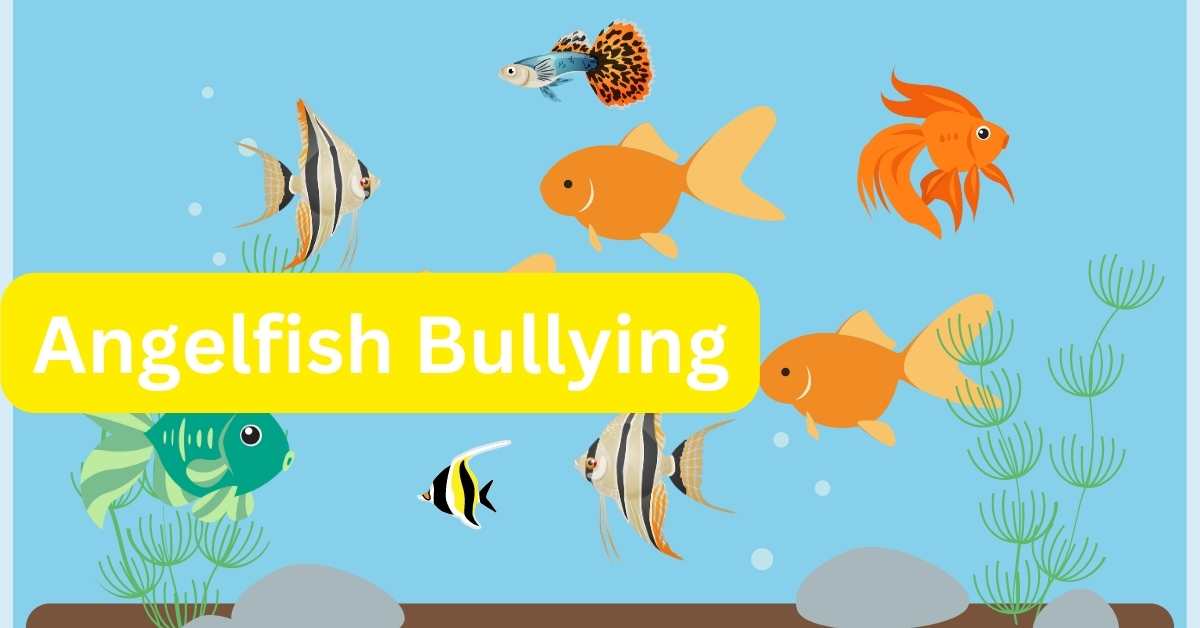
Angelfish are very beautiful and extremely popular aquarium species. It looks more beautiful to see them swim in a community tank; it’s the most satisfying for fish keepers. However, as always, a beautiful thing has one drawback; in this case, it includes the trouble that occurs between two species or even within a species.
Why is your Angelfish bullying other Fish?
Angelfish bullying is not that surprising. Every angelfish community faces this issue if the conditions provided are not favorable.
Following are the reasons why your angelfish is bullying other fish:
Lack of Space
One of the common reasons the angelfish bullies the other angelfish in the tank is a lack of space. Low space will make them bully other fish in the tank. Additionally, they are territorial, especially in the breeding season.
Limited Food
Another cause behind Angelfish bullying is limited food. Competition starts when you provide them with limited food. It leads to angelfish bullying of the other fish in the tank. You will notice that your angelfish is fighting and bullying the other tankmate to gain or eat more food.
Ready to have babies
During the breeding season, you will notice that the female angelfish protects her eggs from the other fish in the tank. She will bully them, and if need be, she will also chase them away in order to keep her offspring safe.
Must check out: how fast do angelfish fry grow
Not giving space to female Angelfish
In a community tank, male and female angelfish live together; however, sometimes male angelfish may harass the female angelfish if the space is not enough for them to hide. Additionally, female angelfish need to lay eggs during the breeding season, so ensure that she has enough space and hiding spots.
If you notice your angel fish stays in corner of tank then you must have to keep an eye on your fish. There could be so many reasons for to happen this.
How Do I Tell If Angelfish Are Fighting?
If you have a community tank, you must know the signs of fighting and aggressiveness. Nevertheless, it’s important to recognize the signs that angelfish are fighting with each other so you can take action in order to keep your fish safe, happy, and healthy.
Following are the signs that tell Angelfish are fighting
Following the other fish
If you notice that your angelfish is following the other fish and chasing them in the tank, That means they are getting territorial.
Also, read: Why is my angel fish not eating
Facing off
Another sign you can notice is when the two angelfish go face-to-face, which means they are fighting. They make themselves look bigger by standing in the way and spreading their fins with eye contact.
Getting close
When the two angelfish move toward each other within a short period of time, they may get upset by that. When these fish get close to each other, they may show signs of aggression.
Nipping
Angelfish express their anger by nipping the fins or lips of the other fish in the tank. Nipping is something serious that shouldn’t be ignored, as it is a sign that the fight is nearing its peak.
Tail Fight Hitting
Angelfish will fight each other by their tails and hit them. This is considered an insane fight when the fish are using their tails during the fight.
How to Stop Angelfish Bullying Other Fish?
It’s not good to bully, especially when it becomes excessive. You will have to find solutions in order to stop the bullying. In your tank, if you notice that you have an angelfish that is bullying the other fish in the tank, you should stop it as soon as possible in order to protect other fish from getting hurt.
There are many solutions; that’s a very relieving thing to hear. In this article, you will find everything that will help you stop the angelfish bullying another angelfish. So that your fish is happy and healthy.
Following are the tips you can follow to stop angelfish bullying other fish:
Provide enough food
As mentioned earlier, competition starts when one starts to access more food than other angelfish, and hence the one starts bullying. Always try to provide more food so that it will be enough for every angelfish. Or else, you can also provide them with the same quantity of food more frequently, but in a smaller quantity.
Also, read:
- How to Feed Angelfish Babies?
- Can angelfish eat worms
- Can goldfish eat betta fish food
- Will angelfish eat shrimp
Increase the space for your fish

When it comes to space for angelfish, you should at least provide 30 gallons of tank space, but more is always better for your angelfish to thrive and to stop bullying. If your tank is less than 30 gallons, then there are chances of the angelfish bullying the other angelfish in the tank for space.
However, 30 gallons of the tank is enough for two angelfish; you should always increase their requirements if any fish are added. For a community tank, you should provide at least 50 gallons in order to stop bullying.
Decorate the aquarium to hide
Decorate the tank with rocks and the best aquarium plant. So that they can hide themselves from the other angelfish. When the fish are fighting with each other, the other fish finds a spot to hide. You can set up your tank by adding rocky caves and other decorative items, such as aquarium plants.
Maintain the equilibrium of the pH and the temperature
You should always balance the water conditions in order to keep your angelfish happy. However, this doesn’t happen if the water conditions you provide them are not favorable. Angelfish may nip at other fish if they don’t like the water conditions. Ensure that the water you provide them is not hard. It should be a little acidic.
The ideal pH level for angelfish to thrive ranges between 6.8 and 7.8. When it comes to water temperature, you should always maintain a range between 75 and 82 degrees Fahrenheit. If you provide them with favorable water conditions, they stop bullying and nipping the other fish in the tank.
Conclusion
To prevent or stop angelfish bullying, provide ample space and hiding places, rearrange the aquarium, add new fish, and separate aggressive fish if necessary. Monitoring fish behavior regularly and seeking professional advice if necessary can also help ensure a peaceful environment.